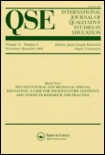
International Journal of Qualitative Studies in Education
Scope & Guideline
Innovating Approaches to Qualitative Studies.
Introduction
Aims and Scopes
- Qualitative Methodologies:
The journal primarily publishes studies utilizing qualitative methodologies, including autoethnography, narrative inquiry, and participatory action research, to explore complex educational phenomena. - Social Justice and Equity:
A core focus on social justice and equity in education is evident, with research often examining the experiences of marginalized groups, including women of color, LGBTQ+ individuals, and immigrant populations. - Intersectionality:
Intersectional analysis is a prominent theme, where research considers how various social identities (race, gender, class, ability) interact to shape educational experiences and outcomes. - Critical Pedagogy:
The journal encourages work that engages with critical pedagogy, questioning traditional power dynamics in education and advocating for transformative practices. - Cultural and Contextual Relevance:
Research published often emphasizes the importance of cultural and contextual relevance, addressing how local histories, cultures, and communities influence educational practices and policies.
Trending and Emerging
- Duoethnography and Collaborative Research:
There is an increasing trend towards duoethnographic methodologies, emphasizing collaborative narratives that explore shared experiences among marginalized groups, particularly in higher education. - Mental Health and Well-being:
Research focusing on mental health and well-being in educational contexts is gaining traction, reflecting a growing recognition of the psychological aspects of learning and teaching. - Decolonial and Indigenous Methodologies:
Emerging themes include decolonial and Indigenous methodologies, which challenge dominant narratives in education and advocate for the inclusion of Indigenous knowledge systems and perspectives. - Critical Race and Feminista Theories:
There is a rising interest in integrating critical race theory and feminista methodologies into educational research, highlighting the intersections of race, gender, and power in educational settings. - Arts-Based and Creative Methods:
The use of arts-based and creative methods in qualitative research is becoming more prevalent, allowing for innovative expressions of lived experiences and challenging traditional research formats.
Declining or Waning
- Traditional Educational Models:
Research focused on traditional educational models and standardized testing is appearing less frequently, as the journal pivots towards more progressive and inclusive educational practices. - Generalized Educational Policies:
There is a noticeable decline in studies that address educational policies in a generalized manner, with a shift towards more nuanced, context-specific analyses that highlight local and community-based practices. - Quantitative Approaches:
The journal has seen a waning interest in quantitative research methodologies, as the qualitative focus intensifies, favoring in-depth explorations of lived experiences over statistical analyses. - Historical Research:
While historical perspectives are important, there has been a decrease in papers that focus solely on historical education research without a qualitative lens, as the journal emphasizes contemporary issues and methodologies. - Single-Dimensional Studies:
Research that does not incorporate intersectional or multidimensional perspectives is less common, indicating a shift towards more comprehensive studies that recognize the complexity of educational experiences.
Similar Journals
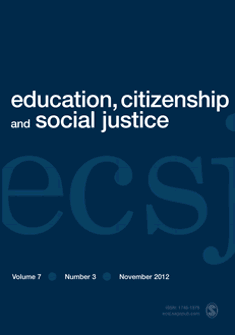
Education Citizenship and Social Justice
Empowering voices in education and social justice.Education Citizenship and Social Justice is a prominent academic journal published by SAGE Publications Inc, dedicated to advancing the discourse around education's role in citizenship and social justice issues. Since its inception in 2006, the journal has provided a critical platform for researchers, educators, and policymakers to explore the intersections of education, citizenship, and equity within diverse societal contexts. With an impressive ranking of #685 out of 1543 in the Social Sciences - Education category and a 2023 Quartile 2 status, it is firmly established as a significant resource in its field. Although the journal does not currently operate with an open access model, its impact on the education sector remains profound, offering valuable insights that contribute to the development of inclusive educational practices. Researchers and students alike will find the journal's rigor and commitment to social justice principles vital as they navigate the evolving landscape of educational research and policy.
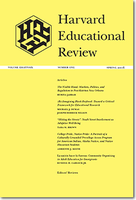
HARVARD EDUCATIONAL REVIEW
Transforming Educational Discourse.HARVARD EDUCATIONAL REVIEW, with an ISSN of 0017-8055 and E-ISSN 1943-5045, is a prestigious journal published by the Harvard Graduate School of Education. Established as a vital platform for the discourse on educational theory and practice, this journal aims to present innovative research and critical analyses that influence the educational landscape. Although it does not currently offer Open Access options, it remains accessible through institutional subscriptions, ensuring a wide reach within both academic and professional communities. With a legacy of scholarly contributions dating back to its converged years from 1979 to 2017, HARVARD EDUCATIONAL REVIEW continues to be an essential resource for researchers, educators, and policy makers dedicated to enhancing educational methodologies and practices. It stands out as a cornerstone in the field of education, promoting dialogue that bridges theory and application.
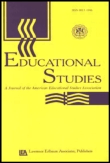
Educational Studies-AESA
Navigating the complexities of education through rigorous research.Educational Studies-AESA, published by Routledge Journals, Taylor & Francis Ltd, is a prestigious peer-reviewed journal that serves as a vital platform for sharing cutting-edge research in the fields of education, sociology, and political science. With an ISSN of 0013-1946 and an E-ISSN of 1532-6993, this journal holds a commendable status, reflected in its strong rankings: it is positioned in the Q2 category in both Education and Sociology/Political Science, emphasizing its significant impact in these disciplines. Moreover, with Scopus rankings that place it in the 62nd and 48th percentiles within its categories, Educational Studies-AESA is recognized for its contributions to scholarly discourse and is an essential resource for researchers, professionals, and students alike seeking to deepen their understanding of educational dynamics and their societal implications. While this journal is not currently open access, it remains a vital scholarly source, enriching the academic community from its base in the United Kingdom, addressing vital educational issues from 2018 to 2024 and beyond.
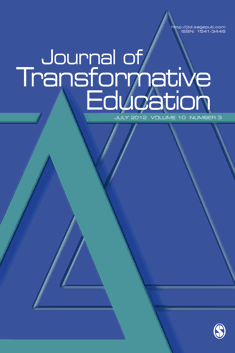
Journal of Transformative Education
Fostering Educational Innovation for Lasting ImpactJournal of Transformative Education, published by SAGE PUBLICATIONS INC, stands as a pivotal resource within the field of education, dedicated to fostering innovation and positive change in educational practices. Established in 2003 and continuing through to 2024, this journal boasts an impressive range of contributions that are crucial for academics, policymakers, and practitioners focusing on transformative learning processes. With a current classification in the Q3 quartile for education in 2023 and a respectable Scopus ranking of 730 out of 1543, this journal provides a platform for high-quality research and discourse. Although it is not an open-access journal, its findings are invaluable for those seeking to enhance educational methodologies and learner engagement. The Journal of Transformative Education is a must-read for anyone interested in the evolving landscape of educational theory and practice, as it continuously aims to inspire and guide transformative educational initiatives.

INTERNATIONAL REVIEW OF EDUCATION
Exploring Innovations in Learning and TeachingINTERNATIONAL REVIEW OF EDUCATION is a premier academic journal published by SpringerNature, recognized for its substantial contributions to the field of education since 1955. With an ISSN of 0020-8566 and an E-ISSN of 1573-0638, it has established itself as an essential platform for interdisciplinary research and discourse. The journal boasts an impressive Q1 ranking in Education and a Q2 ranking in E-learning for 2023, positioning it among the top tier of scholarly publications. According to Scopus, it ranks #224 out of 1543 in the Social Sciences - Education category, corresponding to the 85th percentile, reflecting its influence and relevance in the academic community. The INTERNATIONAL REVIEW OF EDUCATION seeks to advance understanding in both theoretical and practical aspects of education, making it a vital resource for researchers, educators, and policymakers alike. Access to its comprehensive studies and reviews facilitates the continuous development of innovative educational practices, ensuring relevance in a rapidly changing global landscape.
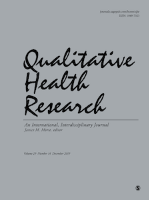
QUALITATIVE HEALTH RESEARCH
Unveiling the Complexity of Health OutcomesQUALITATIVE HEALTH RESEARCH is a pivotal journal published by SAGE Publications Inc, specializing in the dynamic field of qualitative research within public health and health services. With an ISSN of 1049-7323 and an E-ISSN of 1552-7557, this esteemed publication has secured a prominent position in academic discourse, as evidenced by its Q1 ranking in the 2023 category of Public Health, Environmental and Occupational Health and a Scopus rank of #100 out of 665, placing it in the 85th percentile. Since its inception in 1991, the journal has fostered innovative methodologies and diverse perspectives, making it an essential resource for researchers, professionals, and students dedicated to understanding the complexity of health experiences and outcomes. Although it does not feature open access, QUALITATIVE HEALTH RESEARCH remains committed to advancing knowledge and scholarly dialogue, ensuring that significant contributions in qualitative methodologies are readily available to a global academic audience.
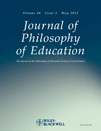
JOURNAL OF PHILOSOPHY OF EDUCATION
Connecting Historical Contexts with Modern Educational Practices.JOURNAL OF PHILOSOPHY OF EDUCATION, published by Oxford University Press, serves as a premier platform for interdisciplinary research at the intersection of education, history, and philosophy. Established in 1967, this journal has consistently contributed to the academic discourse by publishing insightful articles that challenge conventional thinking and inspire innovative pedagogical practices. With a distinguished ranking in the top quartiles of History and Philosophy and a respectable Q3 position in Education, it occupies a significant niche in the scholarly community. The journal's high Scopus rankings signify its impact, being placed in the 94th percentile for History and the 86th percentile for Philosophy. It welcomes contributions that explore theoretical frameworks, historical contexts, and practical implications of philosophical inquiries into education. Although it does not currently offer Open Access options, the journal remains a vital resource for academics and practitioners seeking to deepen their understanding of educational philosophy. With contributions expected to continue until 2024, the JOURNAL OF PHILOSOPHY OF EDUCATION is poised to remain a crucial avenue for advancing educational thought and research.

Linhas Criticas
Unveiling critical insights for global discourse.Linhas Críticas is a prominent open access journal published by UNIV BRASILIA, dedicated to fostering scholarly discourse in the fields of social sciences and humanities. With ISSN 1516-4896 and E-ISSN 1981-0431, the journal has been fully accessible since 2014, reflecting its commitment to disseminating high-quality research to a global audience. Positioned as a vital resource for researchers, professionals, and students alike, Linhas Críticas offers a platform for innovative ideas and critical analyses that engage with contemporary social issues, theories, and practices. The journal aims to enhance interdisciplinary understanding and foster dialogues that contribute to academic growth. By emphasizing rigorous peer-reviewed articles, Linhas Críticas continues to establish itself as an essential publication for those seeking to explore and contribute to critical thought in Brazil and beyond.
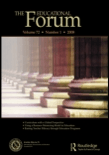
EDUCATIONAL FORUM
Pioneering Research for a New Era of EducationEDUCATIONAL FORUM, published by Routledge Journals, Taylor & Francis Ltd, is a premier academic journal that serves as a vital platform for innovative research and discourse in the field of education. With an ISSN of 0013-1725 and an E-ISSN of 1938-8098, this journal has been at the forefront of educational scholarship since its inception in 1936, continuing to disseminate critical insights through 2024. Recognized in the Q2 category of education in 2023, it holds a Scopus rank of 768 out of 1543 in the social sciences, placing it in the 50th percentile overall. Though it does not offer open access, the journal provides an essential resource for researchers, professionals, and students aiming to expand their understanding of current educational practices, policies, and innovations. By fostering an academic environment rich in rigorous analysis and thoughtful discussion, EDUCATIONAL FORUM plays an indispensable role in shaping the future of education.
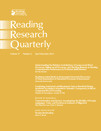
READING RESEARCH QUARTERLY
Transforming reading research into educational excellence.READING RESEARCH QUARTERLY is a premier academic journal dedicated to advancing the understanding of reading research within the domains of educational psychology and literacy development. Published by Wiley, this journal has been a vital resource for researchers, educators, and practitioners, featuring empirical studies, theoretical papers, and comprehensive reviews since its inception. With a remarkable impact factor and consistently ranked in the Q1 quartile for both Developmental and Educational Psychology and Education, it stands out as an authoritative source in the field. Notably, it possesses a strong international presence, evidenced by its Scopus rankings, sitting in the top 3% for educational social sciences and within the top 5% for developmental psychology. Although currently not offering Open Access, the journal ensures that its contributions are accessible through institutional subscriptions. By linking theoretical frameworks with practical applications, READING RESEARCH QUARTERLY serves as an essential platform for fostering innovation and collaboration among scholars and practitioners aiming to enhance literacy education and understanding.